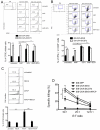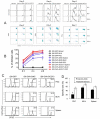CD73 on tumor cells impairs antitumor T-cell responses: a novel mechanism of tumor-induced immune suppression
- PMID: 20179192
- PMCID: PMC2883609
- DOI: 10.1158/0008-5472.CAN-09-3109
CD73 on tumor cells impairs antitumor T-cell responses: a novel mechanism of tumor-induced immune suppression
Abstract
CD73, originally defined as a lymphocyte differentiation antigen, is thought to function as a cosignaling molecule on T lymphocytes and an adhesion molecule that is required for lymphocyte binding to endothelium. We show here that CD73 is widely expressed on many tumor cell lines and is upregulated in cancerous tissues. Because the ecto-5'-nucleotidase activity of CD73 catalyzes AMP breakdown to immunosuppressive adenosine, we hypothesized that CD73-generated adenosine prevents tumor destruction by inhibiting antitumor immunity. We confirmed this hypothesis by showing that combining tumor CD73 knockdown and tumor-specific T-cell transfer cured all tumor-bearing mice. In striking contrast, there was no therapeutic benefit of adoptive T-cell immunotherapy in mice bearing tumors without CD73 knockdown. Moreover, blockade of the A2A adenosine receptor with a selective antagonist also augmented the efficacy of adoptive T-cell therapy. These findings identify a potential mechanism for CD73-mediated tumor immune evasion and point to a novel cancer immunotherapy strategy by targeting the enzymatic activity of tumor CD73.
Figures






References
-
- Zou W. Immunosuppressive networks in the tumour environment and their therapeutic relevance. Nat Rev Cancer. 2005;5:263–74. - PubMed
-
- Schreiber H, editor. Tumor Immunology. 5th ed. Lippincott-Williams & Wikins; Philadelphia, PA: 2003.
-
- Resta R, Yamashita Y, Thompson LF. Ecto-enzyme and signaling functions of lymphocyte CD73. Immunol Rev. 1998;161:95–109. - PubMed
Publication types
MeSH terms
Substances
Grants and funding
LinkOut - more resources
Full Text Sources
Other Literature Sources
Medical
Research Materials

